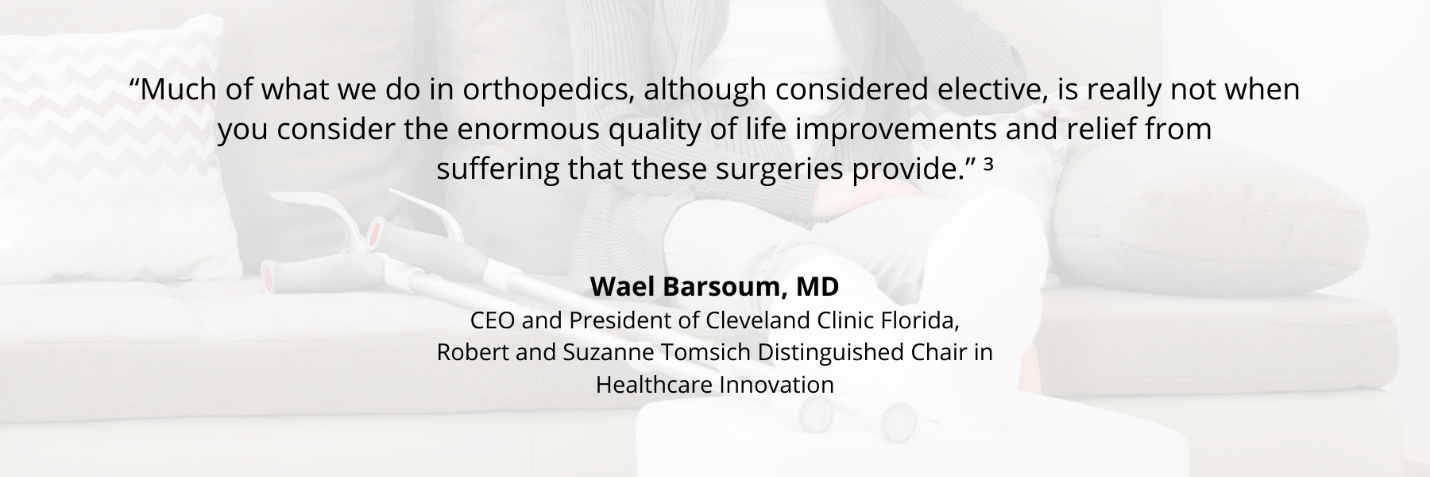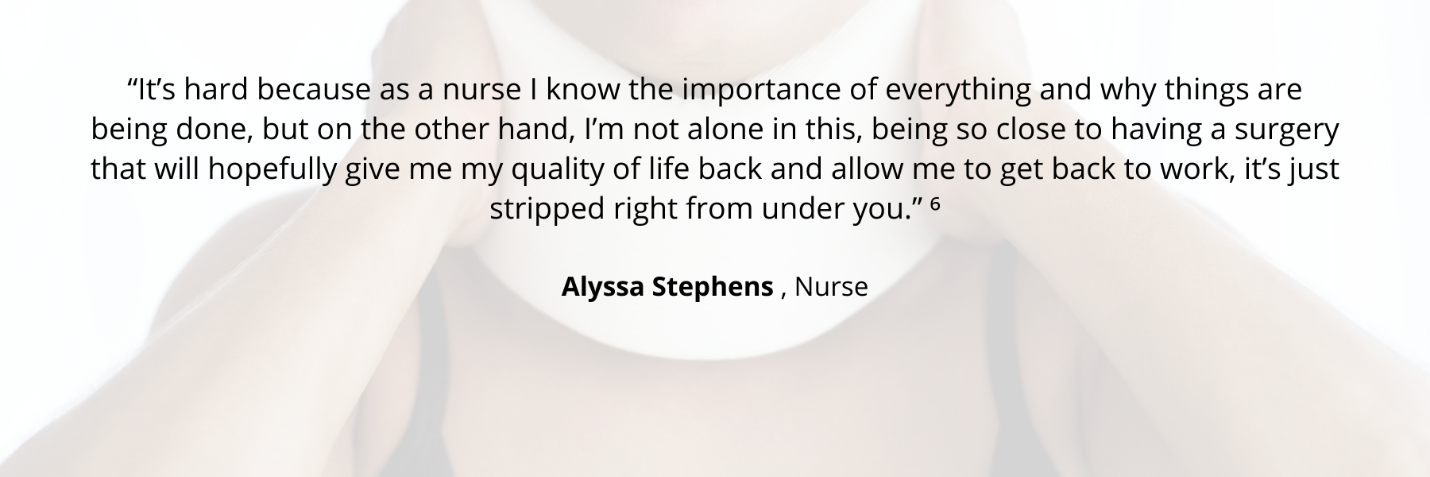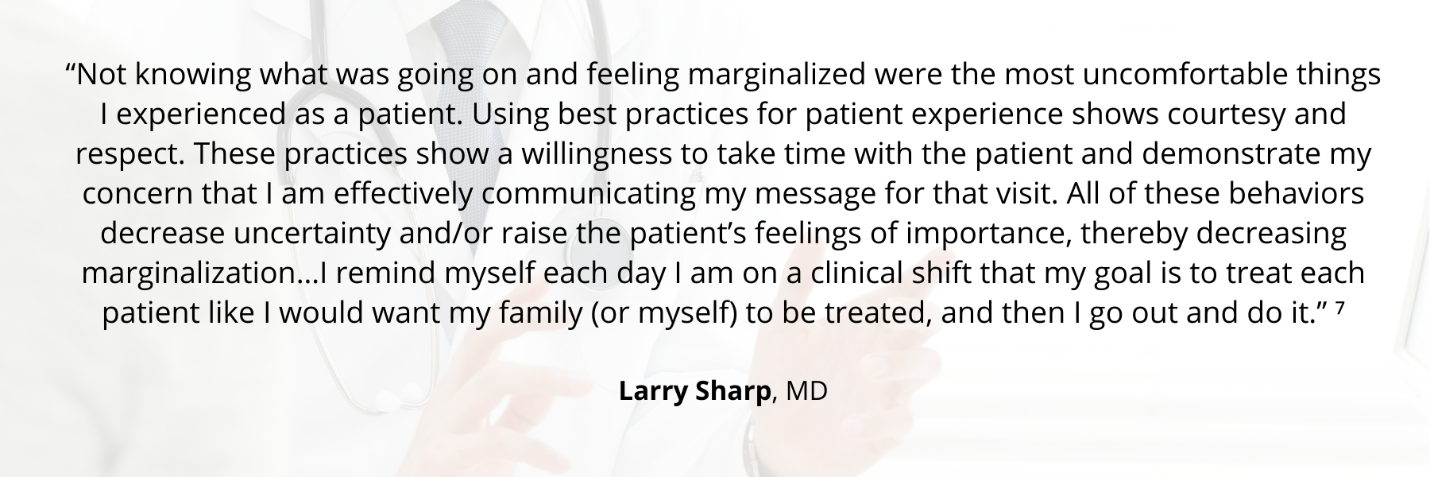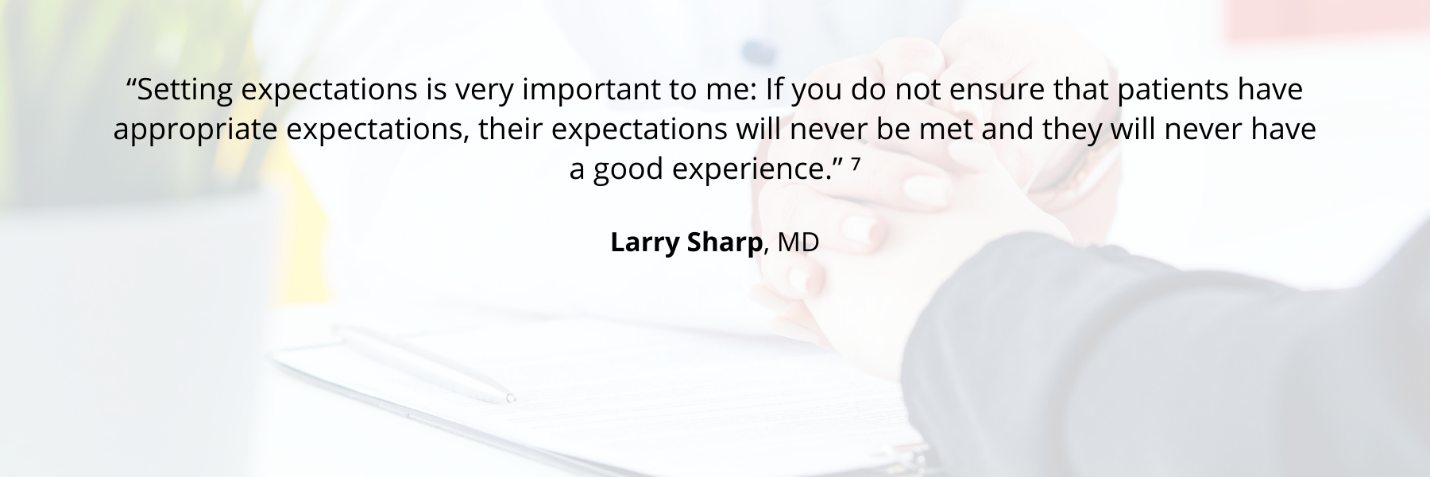Authored By: OrthoEvidence
May 26, 2020
60 Second Synopsis
Non-urgent surgical procedures are starting to resume despite the unremitting risks posed by COVID-19. For patients and care providers, this news is both reassuring and unnerving. Healthcare providers are now considering a multitude of factors and trying to answer many questions—Who needs surgery? When are they likely to get their restorative procedures? and How will we manage to serve all who need help under limited resources? Still, during this important decision-making process, we need to ensure that policy does not overshadow a patients’ greatest need: to feel cared for. Some patients whose surgeries have been cancelled are living in fear while others are simply fearful of having surgery – both represent a suboptimal outcome. In this OE original, we discuss the impact that cancellations can have on patients and what we can do to support them.
A Poor Choice of Words. Most Surgery is Not “Elective”
The word ‘elective’ is used to describe surgeries that have been postponed due to COVID-19. To a patient though, what does this truly mean? Even health professionals agree that this word is a bit of a misnomer.1 It encompasses many different surgeries, from less urgent procedures that are more easily postponed to emergent procedures that go ahead as planned. According to Gerard Doherty, the chair of the surgery department at Brigham and Women’s Hospital in Boston, it’s the ones that fall somewhere in the middle (where delaying surgery could bring harm) that are the trickiest.2 Patients in this category could find themselves especially stressed; worrying about if their condition will worsen and how long they will be waiting for relief. However, the experience of having a surgery cancelled will undoubtedly be stressful for all patients, no matter the urgency. Afterall, a surgery always has the potential to be life-altering for the patient.

The Canadian Orthopaedic Association believes the majority, if not all, orthopaedic surgeries are not “elective”; rather, they are “restorative”—restoring function, restoring well being, restoring quality of life. The statement issued by the COA states, “Further delaying critical restorative orthopaedic surgery is not sound health policy but rather a horrible failure to distressed patients Canada wide.” 11
The Perils of Postponement
The postponement of surgeries has shown to have several consequences. Logistically, cancellations cause a lot of extra work for surgical departments and can mean more paperwork and planning, especially in getting things back on track.4 However, the most immediate consequences are being faced by patients themselves. Prolonged wait times will mean patients must live with pain or discomfort for longer and during this period, a patients’ condition could worsen.4 Studies have shown that cancellation can increase a patients’ risk of morbidity or incidences of complications after surgery. Additionally, patients who experienced a surgical cancellation were more likely to experience higher pain levels post-operatively when compared to patients whose surgery was not cancelled.4
Perhaps more overlooked consequences, are those pertaining to patient mental health. A study by Caesar et al. (2019) examined the lived experiences of ten patients with cancelled total hip replacement or total knee replacement surgeries. The analysis of interview transcripts revealed a few common themes impacting daily L.I.F.E
Lack of Dignity: Patients described a sense of being treated without dignity or ‘as just a number’. One patient worded feeling “like a pawn in a game” and said “sometimes I wonder if they know what they are doing with people. It’s probably not easy being them, but that isn’t what I mean, but (silence) I’m a human not just a number. I am a human being.” 5
Injustice: Patients brought up feelings of unfairness. With everything they had done to prepare for the surgery and for aftercare (such as mentally preparing themselves and loved ones, taking time off work or arranging for child care), they felt the news of the cancellation disregarded this effort completely. The whole situation was experienced as an injustice.5
Feeling Conflicted: Patients felt conflicted when they received the news that their surgery was cancelled. In their mind, the surgery was going to happen, and with the unexpected news of a cancellation, they didn’t know how to take it. The cancellation was unexpected and made patients feel stressed with the sudden change.5
Embarrassed: Patients reported feeling uncomfortable, even embarrassed, when they were asked about how their surgery went by others. Needing to respond that it had been cancelled reminded patients about the event and brought up feelings surrounding the cancellation. When faced with questions about the reasons for the cancellation or when it was rescheduled for, patients had no answer and this made the situation awkward.5
Overall, the patients spoke to a sense of rejection and not being taken care of. It was further discussed that “not belonging and being rejected can in fact be one of the deepest and most painful emotions for humans.” 5

Perspective
For some healthcare professionals, experience as a surgical patient provides a unique and important perspective. Nurse Alyssa Stephens of British Columbia, Canada, says she understands why it was so important for hospitals to postpone elective surgeries during the pandemic. As a patient however, she feels frustrated.6

Physician Larry Sharp of Florida, USA also understands what it is like to be a patient. Having gone through three surgeries himself, he uses these experiences to reinforce his own best practices.7 He notes that for him, it was always the small things that made the difference. For example, having his surgeon sit down and take notes as he listened during his visits, or the hospital staff who took the time to introduce themselves and explain what they were doing and why. His experiences, while mostly great, were punctuated with interactions that missed the mark. For example, a worker who rushed in and administered eye drops without introduction or explanation, or a welcome desk staff member who never made eye contact or an effort to connect.7

Healthcare Providers Need to Do At Least 2 Things!
Communicate: Good communication is important, especially in setting expectations for patients. In helping patients understand what to expect, health care workers will be putting patients at ease. This will help to create a more positive experience for patients and perhaps even improve outcomes.8 Improving communication is therefore, a key consideration in the return to surgery. Recommendations include ensuring transparent communication and ongoing follow-up with patients, establishing a fair process for case prioritization and maximizing opportunities to improve care delivery.9

Wasim et al. (2018) also found that when receiving news of a cancelled surgery, patients had a significantly better understanding and satisfaction with the reason when information was provided by the physician, compared to when the information was given by a nurse. When asked directly who they would prefer to receive the news from, nearly all patients felt this was best suited to the physician (91%). Patients also felt they were kept waiting longer then necessary when the news was given by a nurse (60%) compared to when the news was given by the physician (20%).8 These results suggest that communication, especially as updates are given to patients in the weeks to come, might be most effective coming from surgeons directly.
Educate: Patient education can be a powerful tool, especially when used to complement already strong communication strategies. A systematic review published in 2005, found that pre-operative education for orthopedic patients not only improved patient knowledge, but improved rehabilitation performance, self-efficacy, patient compliance, adherence and empowerment. Patient education also reduced anxiety, pain and length of hospital stay.10 Patient education can be offered through physical print or digital materials, or through in-person teaching methods. These materials do, however, need to be well designed and should come from a place of patient empowerment.10 Until surgeries are in full swing, patient education could be modified to include strategies for managing symptoms and information on follow-up routines, patient prioritization, wait times, and contact methods in case patients want to reach out.
References:
- Shapiro, N (2020, May 4). When ‘elective’ surgery is necessary: Operating during the COVID-19 coronavirus pandemic. Forbes. Retrieved from: https://www.forbes.com/sites/ ninashapiro/2020/05/04/when-elective-surgery-is-necessary-operating-during-coronavirus-covid-19/#47ac24dd5468
- Zhang, S (2020, March 17). What it really means to cancel elective surgeries. The Atlantic. Retrieved from: https://www.theatlantic.com/science/archive/2020/03/patients-whose-surgeries-are-canceled-because-coronavirus/608176/
- Hofheinz, E (2020, May 13). Reopening blog – perspectives and protocols. Orthospine News. Retrieved from: https://www.orthospinenews.com/2020/05/11/reopening-blogperspectives-and-protocols/
- Caesar U, Karlsson J, Olsson L. et al. Incidence and root causes of cancellations for elective orthopaedic procedures: a single center experience of 17,625 consecutive cases. Patient Saf Surg 8, 24 (2014). https://doi.org/10.1186/1754-9493-8-24
- Caesar U, Hansson-Olofsson E, Olsson LE, Karlsson J, Lidén E (2019). A sense of being rejected: patients’ lived experiences of cancelled knee or hip replacement surgery. Manuscript submitted for publication. Retrieved from: https://gupea.ub.gu.se/ bitstream/2077/59542/1/gupea_2077_59542_1.pdf
- Little S & Stewart N (2020, April 13). I’m waiting by the phone: BC patients face painful wait for surgeries cancelled for COVID-19. Global News. Retrieved from: https://globalnews.ca/news/6812932/bc-patients-surgery-wait-coronavirus/
- Sharp, L (2017, December 20). Adopting the patient’s perspective. Take time to communication, express concern. The Hospitalist. Retrieved from: https://www.the-hospitalist.org/hospitalist/article/154928/adopting-patients-perspective/page/0/1
- Wasim AS, Shahban S, Goswami, V. Hospital policy following cancelled orthopedic surgery and the patient experience – making the best of a bad situation. J Hosp Manag Health Policy 2018;2:48. http://dx.doi.org/10.21037/jhmhp.2018.10.01
- Ontario Health (2020). A measured approach to planning for surgeries and procedures during the COVID-19 pandemic. Retrieved at: https://www.ontariohealth.ca/sites/ ontariohealth/files/2020-05/A%20Measured%20Approach%20to%20Planning%20 for%20Surgeries%20and%20Procedures%20During%20the%20COVID-19%20 Pandemic.pdf
- Johansson K, Nuutila L, Virtanen H, Katajisto J, Salanterä S. Preoperative education for orthopaedic patients: systematic review. J Adv Nurs. 2005;50(2):212-223 https://doi.org/10.1111/j.1365-2648.2005.03381.x
- The Canadian Orthopedic Association (2020, May 8). COA position statement. Resuming restorative surgery: prioritizing orthopaedic surgery nationwide. Retrieved from: https://coa-aco.org/wp-content/uploads/2020/05/COA-Position-Statement-Resuming-Restorative-Surgery.-Prioritizing-Orthopaedic-Surgery-Nationwide-1.pdf
